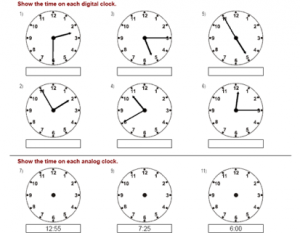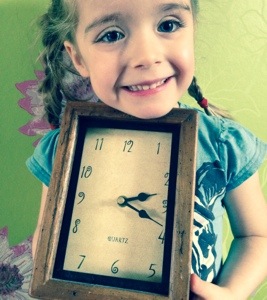Tick-tock! 8.15am, rushing to get shoes and coats on ready for the pre-school run!
“Come on you two – we are going to be late!”
“Late mummy? What’s late mean?”
And so it begins – the explanation of time! At only 3 and 4 years old my two are already interested in learning about telling the time and while it may put the fear into some parents, I’m excited by their willingness to learn so young.
When should children learn to tell the time?
It’s difficult to say when is the right time for littlies to learn how to tell the time because it really depends on their individual development. Some children are learning numbers and clock reading at the age of 3 or 4, others much later when they are in primary school. It’s very much a child thing rather than an age thing, so don’t worry if your 5 year old hasn’t shown any interest yet.
Analogue or digital?
While a digital clock may seem like an easier method to teach time to your little one, the analogue allows for the better comprehension of time by providing hands which consistently move and clear numbers to read.
Once they have the concept of time-telling – it’ll be far easier to gain an understanding of digital clocks.
How can I teach very young children about time?
From a young age your little one will start to become aware and thrive on routine. Because of this – you can introduce time by using phrases for time like morning, noon, afternoon, evening, and night.
Talk with them about times of day and what activities they do and at which time. For example – We go to bed at night-time, and we eat our breakfast in the morning time.
By getting them to talk about times of the day – it’s building a great foundation for understanding time.
Fun activities for telling the time
We love books! They are ideal for understanding and talking about all kinds of subjects, but in particular learning about time. They don’t need to be books with clocks in – just simple stoires covering time. Even night and day books are great as it’s all about introducing time concept at first.
Number books, games and puzzles are also great – without a good understanding of numbers it’s difficult to proceed onto actual reading of the time on clock faces, so start with the basics.
Writing and colouring activities are great fun – Don’t be afraid to introduce work sheets from a young age. It’s great fun adding clock faces to circles ,or matching numbers to the  right times. There are lots of pre-school and primary school learning resources available with printable worksheets.
right times. There are lots of pre-school and primary school learning resources available with printable worksheets.
Older children might enjoy designing their own clocks on paper then making them using a paper plate. And you can’t beat an old fashioned game of ‘What’s the time Mr Wolf?’
For those of you that don’t know this game – one person (the wolf) stands with their back turned to the others. They shout ‘What’s the time Mr wolf, and the person (wolf) shouts various times.
Each time they take a step closer to the wolf. (The aim is to tap them before they turn around.)
When the Wolf says ‘ dinner time’ everyone must run before the Wolf catches them for dinner! Great fun and great learning all in one game!
When should I buy my child a watch?
From as soon as your child takes an interest in time and you are sure they are ready – it’s a great idea to invest in a watch. When I was little I had a snoopy watch and I loved it! I was 5 and thought it was the best thing ever! Having that learning tool with me all the time was perfect for practicing and understanding telling the time.
There are some pretty lovely and practical watches from The Watch Hut. This cute Tikkers rubber strap, analogue watch pictured left, is perfect as the numbers are clear and in bright colours!
Whatever you way you decide to teach your children the time – make it fun! Learning should always be fun and don’t get stressed if your child does’nt understand right away. It takes time!
This is a sponsored post but hey y’all – the opinions and top tips are my own.










Leave a Reply